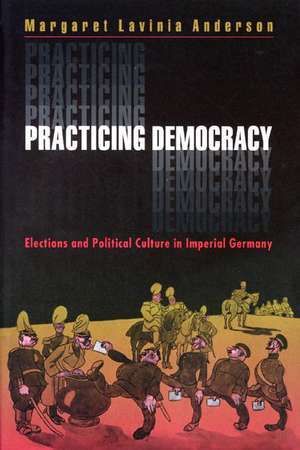Practicing Democracy – Elections and Political Culture in Imperial Germany
Autor Margaret L Andersonen Limba Engleză Paperback – 10 mai 2000
Explicit comparisons with Britain, France, and America give us a vivid picture of the coercive pressures--from employers, clergy, and communities--that German voters faced, but also of the legalistic culture that shielded them from the fraud, bribery, and violence so characteristic of other early "franchise regimes." We emerge with a new sense that Germans were in no way less modern in the practice of democratic politics. Anderson, in fact, argues convincingly against the widely accepted notion that it was pre-war Germany's lack of democratic values and experience that ultimately led to Weimar's failure and the Third Reich.
Practicing Democracy is a surprising reinterpretation of nineteenth- and early twentieth-century Germany and will engage historians concerned with the question of Germany's "special path" to modernity; sociologists interested in obedience, popular mobilization, and civil society; political scientists debating the relative role of institutions versus culture in the transition to democracy. By showing how political activity shaped and was shaped by the experiences of ordinary men and women, it conveys the excitement of democratic politics.
Preț: 270.73 lei
Nou
Puncte Express: 406
Preț estimativ în valută:
51.81€ • 55.40$ • 43.19£
51.81€ • 55.40$ • 43.19£
Carte disponibilă
Livrare economică 27 martie-10 aprilie
Livrare express 13-19 martie pentru 48.93 lei
Preluare comenzi: 021 569.72.76
Specificații
ISBN-13: 9780691048543
ISBN-10: 0691048541
Pagini: 488
Ilustrații: 13 halftones
Dimensiuni: 162 x 235 x 30 mm
Greutate: 0.77 kg
Ediția:New.
Editura: Princeton University Press
Locul publicării:Princeton, United States
ISBN-10: 0691048541
Pagini: 488
Ilustrații: 13 halftones
Dimensiuni: 162 x 235 x 30 mm
Greutate: 0.77 kg
Ediția:New.
Editura: Princeton University Press
Locul publicării:Princeton, United States
Notă biografică
Descriere
Shows how the sudden opportunity to "practice" democracy in 1867 opened up a free space in the land of Kaisers, generals, and Junkers. This book offers a reinterpretation of 19th- and early 20th-century Germany and engages historians concerned with the question of Germany's "special path" to modernity.
